The Canadian (post)-pandemic university
Understanding higher education policy responses to the COVID-19 pandemic to inform (post)-pandemic policy and practices.
Research Projects
Networks of university responses to COVID-19 (2023)

In March 2020, the rapidly spreading COVID-19 cases were declared as a global pandemic and it caused an emergency lockdown across countries around the world. Canadian higher education institutions also had to pivot their operations virtually overnight while following federal, provincial, and local government mandates. Universities adopted a range of different ways to stay connected with their students and employees, and also to keep the wider public informed about the university functioning. Many universities also shared their regular updates on their websites through a dedicated webpage which were further shared through social media handles. In this research we conducted a hyperlink analysis of Canada’s U15 institution COVID-19 ‘hub’ websites to investigate the actors and issues that comprised university response to the pandemic. Using digital tools (IssueCrawler & Gephi), we visualize the hub websites as a network, revealing institutional clusters with some government actors bridging between the clusters.
Who’s involved: Shannon McKechnie (research assistant), Melody Viczko (PI), and Rajender Singh (research assistant).
We would like to acknowledge the work of the members of our extended research team connected to the larger study on university pandemic responses: Mara De Giusti Bordignon, Renata Matsumoto, and Erika Romanelli-Baird (Undergraduate Summer Research Internship).
Visualizing Canadian university responses in pandemic times (2022)

The purpose of this project is to have a comprehensive perspective of main pandemic-related events that contributes to the understanding of the conditions surrounding the university responses to the pandemic. We collected responses covering the period from January 2020 to April 2022 from three universities in Canada: University of Alberta (UA), University of British Columbia (UBC), and Western University (UWO). We used Dedoose to code our data and categorized university communications into five main categories: (a) emotional support and building a shared experience; (b) government mandates and tracing cases; (c) learning modality; (d) spaces of facility, operations, and strategy; and (e) student services. Understanding the chronology of events can help us examine the practices adopted during the pandemic in these universities and inform qualitative studies on pandemic-related responses from the higher education field. The analysis of the responses from the three universities are the initial phase of a research that will map the complete U15 dataset.
Who’s involved: Melody Viczko (PI), Renata Matsumoto (research assistant), and Erika Romanelli-Baird (Undergraduate Summer Research Internship).
We would like to acknowledge the work of the members of our extended research team connected to the larger study on university pandemic responses: Mara Bordignon, Shannon McKechnie, and Rajender Singh.
Project dates: April 2022 – December 2022
Learning modalities and the post-pandemic university (2022)

This project looks at responses, dealing specifically with learning modality, from Western University, the University of British Columbia, and the University of Alberta. One method of analysis included Bacchi’s (2009) ‘What’s the problem represented to be?’ (WPR) poststructural policy approach. The WPR approach considers university responses as policies because they are practices which govern over people, and reveals problem representations, assumptions, and effects. Findings indicated that the labour of teaching and learning became constituted through two main discourses of ‘safety/security’ and ‘the return to normal’.
Who’s involved: Mara De Giusti Bordignon (research assistant), Melody Viczko (PI), and Renata Matsumoto (research assistant).
We would like to acknowledge the work of the members of our extended research team connected to the larger study on university pandemic responses: Shannon McKechnie, Rajender Singh, and Erika Romanelli-Baird (Undergraduate Summer Research Internship).
Project dates: The data set consisted of responses dated from March 2020 to April 2022. The dates in which this research project is active is from June 2022 to present.
Related projects/research: This project looks at one data set (e.g., responses dealing with learning modality) and is part of the larger project looking at Canadian U15 responses. This project utilizes content from the ‘Visualizing Canadian University Responses in Pandemic Times’ project.
Publications: An article has been submitted for review.
Women academics & COVID-19 pandemic (2022)
 How has the impact of the COVID-19 pandemic on women academics’ labour been studied and what have we learned? In this project, we set out to understand how the impact of COVID-19 on women academics’ labour has been taken up in scholarly research since March 2020. We conducted a literature review to find out. Using a scoping review, we conducted a search of academic literature from March 2020 to March 2022 using key search terms, such as women, academic, scholar, COVID-19. We identified 86 titles and then refined our search to select 45 relevant articles. In the literature review, we indicated that five main themes were taken up in research about women academics’ labour: gender inequity, identities and intersectionality, performing work-home binaries, invisible labour and lived experiences. This review informed our next phase of the project which is to analyze policies from the 15 research intensive universities in Canada to see how the impact of COVID-19 on women’s labour has been taken up as a concern in policy.
How has the impact of the COVID-19 pandemic on women academics’ labour been studied and what have we learned? In this project, we set out to understand how the impact of COVID-19 on women academics’ labour has been taken up in scholarly research since March 2020. We conducted a literature review to find out. Using a scoping review, we conducted a search of academic literature from March 2020 to March 2022 using key search terms, such as women, academic, scholar, COVID-19. We identified 86 titles and then refined our search to select 45 relevant articles. In the literature review, we indicated that five main themes were taken up in research about women academics’ labour: gender inequity, identities and intersectionality, performing work-home binaries, invisible labour and lived experiences. This review informed our next phase of the project which is to analyze policies from the 15 research intensive universities in Canada to see how the impact of COVID-19 on women’s labour has been taken up as a concern in policy.
Who’s involved: Mara De Giusti Bordignon (research assistant) and Melody Viczko (PI)
Project dates: September 2021- September 2022
Other recent publications related to COVID-19